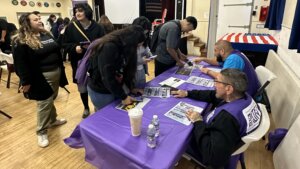
It seemed easy enough, get assigned a hypothetical salary and spend it on essentials, but for some of our students, a financial literacy event called Bite of Reality opened their eyes to the challenges of creating a budget and living within their means.
Korina Echeverria, school counselor, explains how they partnered with a local credit union for Bite of Reality workshops which simulate real-world issues about budgeting. Students are assigned a persona and receive a fictional occupation, salary, spouse, child, student loan and credit card debt, etc. With their new income and responsibilities, they visit various merchants to purchase things like housing, food, childcare, clothing, healthcare and transportation.
“But we don’t want to make it too easy. Each of the teachers staffing the sales booths are encouraged to upsell the students, getting them excited about a shiny sports car, fancy apartment or the most expensive daycare option,” Echeverria said. “They weren’t catching on to the fact that they were getting a hard sell at each of the stations. Then suddenly they were overdrawn and had to visit the credit union tables for some financial counseling.”
April is Financial Literacy Month, raising awareness about the need for more education about money management. In a recent survey, 88 percent of U.S. adults said high school did not leave them fully prepared for handling money in the real world.
Only 25 states mandate a personal finance class in high school and when offered as an elective, it tends to have a low number of students opting in. Echeverria likes the Bite of Reality events because they are fun, interactive and yet quickly show the students that they need to get smart about money.
“This is a safe environment to learn about money management. They can make mistakes with us, rather than in the real world,” she said. “Then we follow up with sessions on budgeting and credit, how to keep track of money and how to achieve financial goals. The lessons presented in a relatable and memorable way.”
In an anonymous feedback survey, one student said, “I learned to be more responsible in the way I spent my money and focus on the necessary things first. I want to learn how to improve my credit scores.”
Another student agreed, commenting, “I learned to have a budget for whatever I want to buy and to be careful with sellers that will always want you to spend more money. I want to learn more about how not to overspend.”
Echeverria points out that it is too easy to get credit in this country, and if you don’t understand how it works, you can quickly find yourself in debt that is difficult to overcome. “It’s rewarding to see students realize that it’s not that difficult to be money smart and avoid the money traps that can derail their future happiness.”
The Bite of Reality app and event was developed by the Richard Myles Johnson Foundation for credit unions to help students learn about money management.
